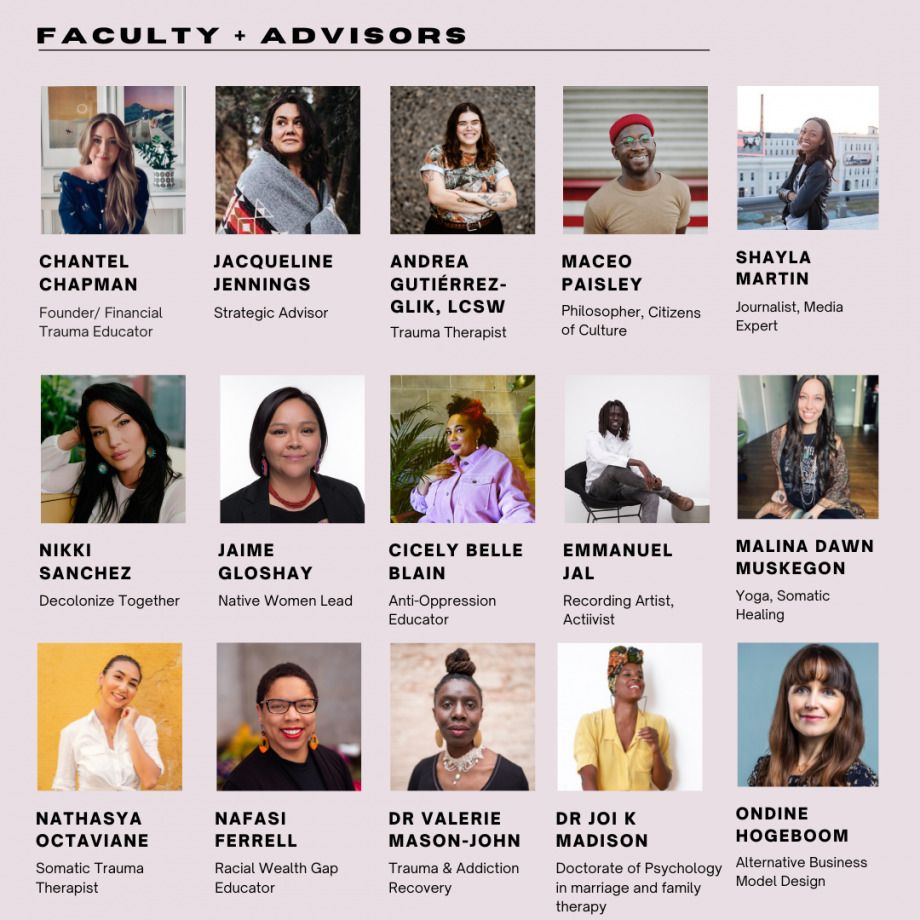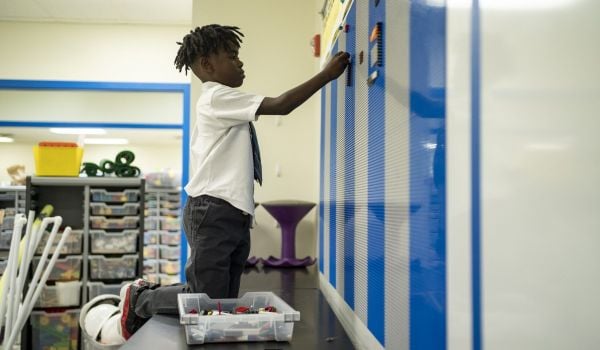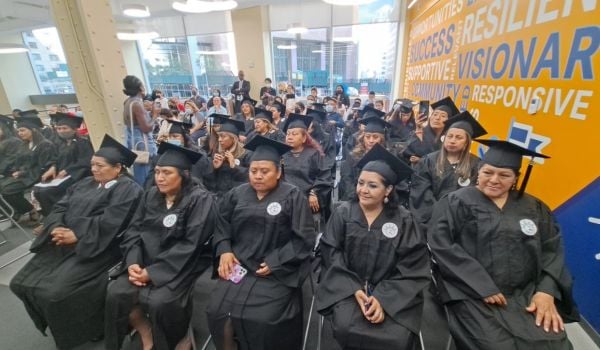When it comes to financial literacy, many programs teach about savings, loans, debt, mortgages or money management. One topic that doesn’t come up: trauma.
That omission made less and less sense to Chantel Chapman, a former mortgage broker and financial literacy consultant, after she started researching addiction, behavioral science, trauma and mindfulness. “I started to notice in my own life that some of the sources of my trauma were deeply connected to the way I was interacting with money,” she says. “I had a bit of an awakening on these connections — my under-earning, my under-charging, my avoidance of finances. My overspending was coming purely from a place of wanting to stop pain and create pleasure.”
That realization led to a “four-year research journey,” as Chapman puts it, that uncovered stark connections between the psychology of trauma and scarcity and our relationship with money. Realizing how little support existed to holistically address these topics, she founded the online financial literacy program The Trauma of Money in 2019.
The program — which offers online classes for both personal and professional development — is grounded in a few powerful acknowledgements. The first is that our relationship with money is deeply impacted by our nervous system and how we react in “survival mode.” The second is that global capitalism — predicated on the exploitation of people and land — is a trauma that impacts all of us, whether we benefit from the exploitation or suffer under it.
Throughout Chapman’s financial career, it’s never been a secret how powerfully her clients were impacted by money. “But so many areas of focus were siloed and weren’t really talking together,” she says. “For people in financial distress, their financial adviser would tell them to stick to their budget. And their therapist would tell them, ‘I’m not a money expert and can’t advise you with that.’”
Chapman developed a model to engage around a core question: What impacts our relationship with money? She believes there are six layers of impact, starting with generational trauma, then relational trauma, societal trauma, systemic trauma, “laws of nature” (which explores other world views influenced by nature, such as reciprocity), and finally financial literacy.
“We always say financial literacy is last,” Chapman says, “Because when someone is in a trauma-triggered state, or a state of scarcity, their prefrontal cortex goes offline.” The prefrontal cortex, she explains, is the part of the brain associated with executive decision making and impulse control. “We go into more of a survival part of our brain, and when we’re in that part of our brain it is very challenging to interact with financial literacy concepts.”
Beginning financial discussions with a trauma-informed viewpoint resonated with Jacqueline Jennings, an impact investment professional, decolonial facilitator and entrepreneurship educator. She is a venture partner with Raven Indigenous Capital Partners and director of Fireweed Fellowship, Canada’s first national Indigenous entrepreneurship accelerator program.
“Any time we would do educational sessions around finance … as soon as an accountant or investor would start talking, half of the students would leave their bodies, totally dissociating, and the other half would try to struggle through,” she says.
And when chief executives would share their success stories, Jennings often uncovered unspoken, underlying privileges. “The veil would fall and these mostly white men would say they had a good exit from the company they worked with, or they got an inheritance, or their family funded them,” she says. “It’s immense privilege and intergenerational wealth that doesn’t exist in Indigenous communities because of legislated poverty.”
Jennings identifies as Northern Cree, Anishinaabe, Métis and European settler descent. Intergenerational wealth on Turtle Island (North America), she points out, is the direct result of Indigenous land, exploited labor or stolen bodies.
For Fireweed Fellowship, she partnered with Trauma of Money to tackle these issues head on. “People were having breakthroughs and self-awareness realizations immediately, experiencing a lot of emotions and a sense of relief to know they’re not just ‘bad’ at money,” she says. The curriculum gave participants space to explore personal traumas related to money, alongside the larger, systemic oppressions of capitalism as an Indigenous person.
Jennings is now a strategic adviser for Trauma of Money, where there’s a diverse team of faculty and advisers who bring different anti-colonial approaches to the curriculum.
“We encourage them to use their own experiences as examples, so people don’t feel like there are hierarchies between you and them,” Chapman says. “It creates an environment that is much more open.”

The Trauma of Money faculty and advisers (Image courtesy of The Trauma of Money)
Nikki Sanchez is a Pipil and Irish-Scottish academic, media maker and environmental educator who also teaches Trauma of Money curriculum. “For me it’s really important that people understand the history of this system — so many people don’t think about alternatives to capitalism or alternative economies,” she says. “I want people to understand this is only one system that’s been imposed and is now the dominant system globally.” She also stresses to the class that capitalism “is not a neutral or value-free system.”
With that background, participants unpack their first experience with money, which often touches on family relations and larger questions of identity. “I try to present a big picture, with themes like racism, capitalism and patriarchy, then when people share their personal experiences we map how those themes showed up for it,” Sanchez says.
Sanchez, Jennings and Chapman all spoke to the importance of radically shifting narratives and paradigms around our finances. “Trauma of Money really helps people redefine what wealth and value is,” as Sanchez puts it. “We’re asking — what is the most valuable thing to you? You walk away from putting all of the power in money, you see all the things that are just as, if not more, significant.”
The Trauma of Money expanded its team to meet increased demand for classes from around the world — and from people representing a range of income levels. Jennings points out that “poverty and wealth are both socially isolating … any opportunities to cross those lines is important for building compassion and empathy.” (The company offers partial scholarships “to folx who are on a journey of healing from economic marginalization or who will be serving communities who have been economically impacted.”)
There’s also demand across a range of industries, including entrepreneurship programs, financial institutions and charitable organizations. To reach more people, Trauma of Money offers professional certification for people wanting to integrate the approach into their own offerings — everyone from therapists to venture capitalists.
“I think about a future where this work is widespread and we get to interact with folks who all have an awareness of their triggers and narratives, and they’re on a healing journey,” envisions Jennings. “Because it is the intention of capitalism to keep folks controlled and afraid and in line, the liberation that feels possible through this work is really exciting.”
This article is part of The Bottom Line, a series exploring scalable solutions for problems related to affordability, inclusive economic growth and access to capital. Click here to subscribe to our Bottom Line newsletter.

Emily Nonko is a social justice and solutions-oriented reporter based in Brooklyn, New York. She covers a range of topics for Next City, including arts and culture, housing, movement building and transit.
Follow Emily .(JavaScript must be enabled to view this email address)


















